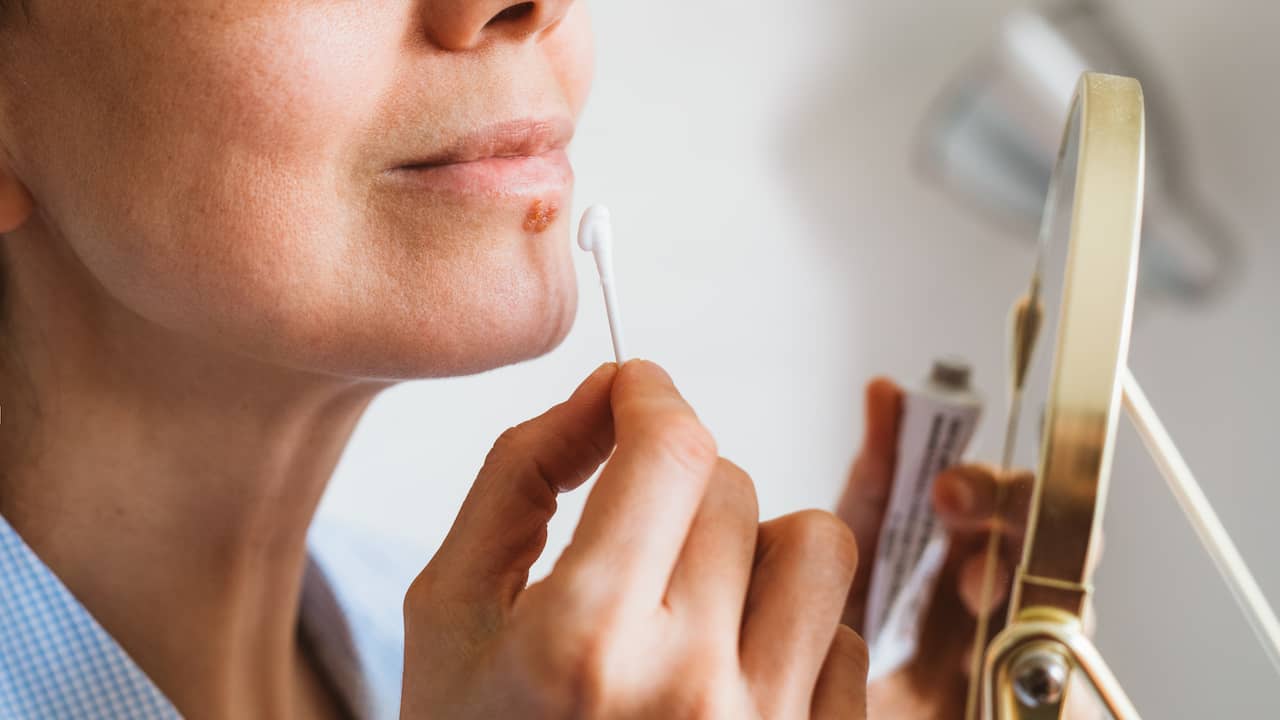One in three people know the feeling: itchy and burning blisters on and around the lips, especially when the days are warm and very sunny. Cold sores are annoying and you carry the virus responsible with you for the rest of your life. How do you ensure that you suffer as little as possible from it?
By Jan van Houten“The first time you get a cold sore from someone else,” says dermatologist Eugene de Zwart-Storm. The virus jumps through skin contact, such as kissing, is forever in your body and evades your immune system.
–
“If you’ve had a cold sore once, the virus stays with you. It ‘sleeps’ in the nerve endings until it is triggered again.” Cold sores, also called herpes labialis, are caused by the herpes simplex virus type 1. Another variant thereof, type 2 or genital herpes, is a venereal disease that mainly manifests itself around the pubic area.
–
You can recognize an incipient cold sore by redness, blisters and often a burning, stinging or painful feeling, says De Zwart-Storm. “You often feel it before you see it. If you’ve never had a cold sore, the initial infection is often severe. It can affect the entire mouth, rather than just the lip.”
–
More risk with a reduced skin barrier
One in three The Dutch have sometimes had cold sores, according to the Dutch College of General Practitioners (NHG), but up to 80 percent of the population carries the virus. In one in ten people, the cold sore reappears several times a year. “When you’re tired or stressed, you’re more likely to get it again. Bright sunlight also plays a role,” says De Zwart-Storm. “That’s why so many people get cold sores on vacation or after they’ve had a cold.”
–
Dry and easily irritated skin can spread herpes infection more easily. Sometimes it is so bad that the whole face is affected.
Your fitness and that of your immune system determine when you can get a cold sore, according to the dermatologist. “Quite a lot of people are predisposed to hay fever, asthma and eczema. This group often has a reduced skin barrier. You notice this by having dry and easily irritated skin. In those people a herpes infection can spread more easily. Sometimes so much that it whole face is affected.”
–
“A cold sore is annoying, but in most cases will go away on its own if you are otherwise healthy,” explains De Zwart-Storm. “You don’t have to do anything about it. Prevention is better than cure. Using sunscreen can prevent some of the outbreaks.”
–
Do not touch with your hands
Cold sores are very contagious in the blister stage, says De Zwart-Storm. “You can transfer it by kissing. And by touching your cold sore with your hands and then someone else. So it’s important to take this into account from the moment you feel it coming.”
–
The most elegant way is the antiviral patches. These hide the infection and prevent you from touching it unnoticed.
If you have a cold sore, you can dry it with zinc ointment, although it can cause some skin irritation, says the dermatologist. “A numbing cream is sometimes prescribed for the pain, but this does not ensure faster healing.” According to the NHG, this antiviral cream can only slightly shorten the healing time in the early phase, so before scabs appear.
–
The eye also wants something, especially if you want to stroll along the boulevard. “You can hide your cold sore under some zinc,” says the dermatologist. “The most elegant way is the antiviral patches. These hide the infection and prevent you from touching it unnoticed, which could infect someone else.”
–
Resistant virus and gene therapy
Science does not sit still, De Zwart-Storm knows. “Herpes infections have been described since ancient times. Fortunately, there are several antiviral creams and tablets available today, but with long-term treatment, there is a chance that the herpes virus will become resistant to the medication. Therefore, science is looking for alternative ways to fight the virus.”
–
The search for a vaccine against the virus is underway, but so far without success. In addition, bright minds are looking at gene therapy, says De Zwart-Storm. “Our genes determine how our bodies are made and cells work, this also applies to the virus. A herpes virus has specialized to ‘dwell’ in nerve cells. The intended gene therapy works by specifically breaking the virus DNA, causing the virus to cannot survive. This would be the only way to cure people of a herpes infection.”
–
Zo voorkom je dat je anderen besmet:
- Was de handen na elke aanraking van de koortslip, gebruik handdoeken niet samen met een ander.
- Reinig eet- en drinkgerei goed en laat dit niet door anderen gebruiken.
- Krab niet aan korstjes, maar wacht tot deze er vanzelf af vallen.
- Knuffel of verzorg tijdens een koortslipepisode geen baby’s.
- Vermijd zoenen en oraal sekscontact.
–
Unfortunately this content cannot be displayedWe do not have permission for the necessary cookies. Please accept the cookies to view this content.
–


